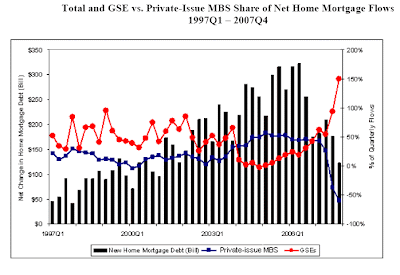
 A group of economists did a study to see if sub-prime lending caused the housing price bubble... From the abstract of their study: "Significant policy attention and concern has been focused recently upon the extent, degree, and duration of the “housing bubble” associated with the sharp rise and then drop in home prices over the period 1998-2008. The widespread availability of sub-prime and other alternative mortgage products during this period, while arguably increasing homeownership rates (at least temporarily), has been broadly blamed for these market outcomes. In this paper we empirically investigate the validity of this proposition against several other alternative explanations."
A group of economists did a study to see if sub-prime lending caused the housing price bubble... From the abstract of their study: "Significant policy attention and concern has been focused recently upon the extent, degree, and duration of the “housing bubble” associated with the sharp rise and then drop in home prices over the period 1998-2008. The widespread availability of sub-prime and other alternative mortgage products during this period, while arguably increasing homeownership rates (at least temporarily), has been broadly blamed for these market outcomes. In this paper we empirically investigate the validity of this proposition against several other alternative explanations." Well, they build their model and crunch their data and conclude that:
- Up to 2003 housing prices were mostly dictated by the fundamentals e.g. population, growth, unemployment, incomes, etc.
- However, after 2003 fundamentals no longer explained housing prices as well.
- Sub=prime loans per se did not cause the bubble.
- Finally, they indicate that as the two GSEs (i.e. Fannie Mae and Freddy Mac) essentially were out of the business from 2004 to 2006, the asset-backed securities (ABS) that came in and filled the gap contributed the most to the run up in housing prices. They say "... The most important and heretofore unrecognized impact of lending patterns on subsequent house price returns was found to originate with the regime-shift which occurred in early 2004, with the squeezing out of the GSE‘s from the market, both because of political, regulatory, and economic factors. The resulting reshuffling of supply of mortgage capital in the market, resulted in both a record increase in total lending volume after 2003 and a substantial substitution of alternative private instruments for conventional conforming GSE loans... The dominant policy conclusion that can be drawn from the findings of this paper is that the existence of subprime loan products alone may not merit primary blame for the problems currently being experienced in the housing and mortgage markets. Rather, political and regulatory actions and economic conditions -- which led to a disruption in traditional flows of credit into the market and permitted not only new instrument designs, but also weaker underwriting standards, to flow in great volumes into the void – may be deemed complicit, if not dominant in precipitating the subsequent series of adverse events."
Of course, when things started to go bad the ABS share feel off in a hurry, and the share of mortgages via the GSEs exploded... Bottom line: Wall Street did it :) However, as mentioned in 'Crashing the party' Main Street participated in full and was fully complicit...
Subprime lending and the housing bubble: Tail wags dog?
